Subscribe to our E-Letter!
Subscribe to our e-mail and stay up-to-date with news and resources from street vendors around the world.
StreetNet International has developed a new project, aimed at mobilizing youth activists and bridging the information gap between StreetNet and its affiliate organizations. The “Youth Reporters on the Ground” was officially launched in June 2021, with 11 participants from SNI affiliates from different countries. Until December 2021, these youth reporters will be following trainings on communication and report on the activities of street vendors and their organizations.
A project for youth empowerment
In many countries, educated, creative and hardworking young people face many challenges when attempting to enter the formal job market, which leaves a huge number of people without opportunities. Youth unemployment is a global challenge that pushes many young people to be engaged in informal economy jobs. Many of our youth reporters are currently enrolled in university or hold university degrees, but the majority also has experience as street vendors as a way to make ends meet. However, they mostly have larger dreams to transition to the formal economy, especially to work as journalists.
These young people have a lot of potential and can become fierce defenders of informal economy workers’ rights, if they are given the chance. But we have to empower them – develop their skills, showcase their work, and bring them closer to StreetNet as a global alliance they can leverage to make a difference in their own communities and potentially become great leaders by themselves and inspire others.
Networking for global solidarity
Young street vendors are an asset for their organizations, but they are often disconnected from each other. Since young street vendors do not usually hold leadership positions, they do not have the same opportunities to participate in international events to foster solidarity. That is why projects that involve young street vendors from several countries are important – for these young people to understand that there are many others like them and that they can work together, now and hopefully in the future.
Global alliances of informal economy workers, such as StreetNet, aim to foster global solidarity. And that is exactly what we hope to achieve with the Youth Reporters on the Ground project.
Bridging the information gap
As a global organization, StreetNet is present in over fifty countries. This means it is a challenge to collect live information, stories, quality videos, and images from all regions and countries on a regular basis. Many of our affiliates also struggle to have a designated person responsible for communication – often, other pressing issues take precedence. However, communication is key to mobilize workers, combat the stigma against street vendors, pressure decision-makers and raise-awareness of the issues faced by informal economy workers.
Therefore, by training young people members of our affiliate organizations, we can bring their communication to a more professionalized level. We will also be able to have a committed group of advocates to rely on whenever we need communication materials or information related to the situation in a given country or region.
This strategy favors StreetNet as a global organization, but it also contributes to the capacity-building of our affiliates.
Communication for social change
This project will not simply equip the participants with communication skills, such as knowing how to take a photograph or storytelling. It will do so with a focus on fostering social change. That means knowing about many other issues, such as how to use stories for advocacy purposes and be aware of ethical issues in the visual depiction of street vendors. It also means learning how to use communication to influence and change people’s lives in a respectful, engaging, and participatory way.
In the words of our International Coordinator, Oksana Abboud:
“Youth is a trigger for any possible change in society, that’s why focus and investment in youth will be always a priority for StreetNet development and sustainability strategy. The Youth Reporters Project is a great initiative to start active engagement and involvement of youth among StreetNet affiliates through capacity building and empowering them to become future leaders of their organizations and communities”.
Who are our Youth Reporters?
Click on the images below to get to know our Youth Reporters in their own words! Their first assignment is to tell us a bit about themselves, why they became advocates for the rights of street vendors and why they chose communication as a tool:
Denis Kalungi (UMAEU – Uganda)
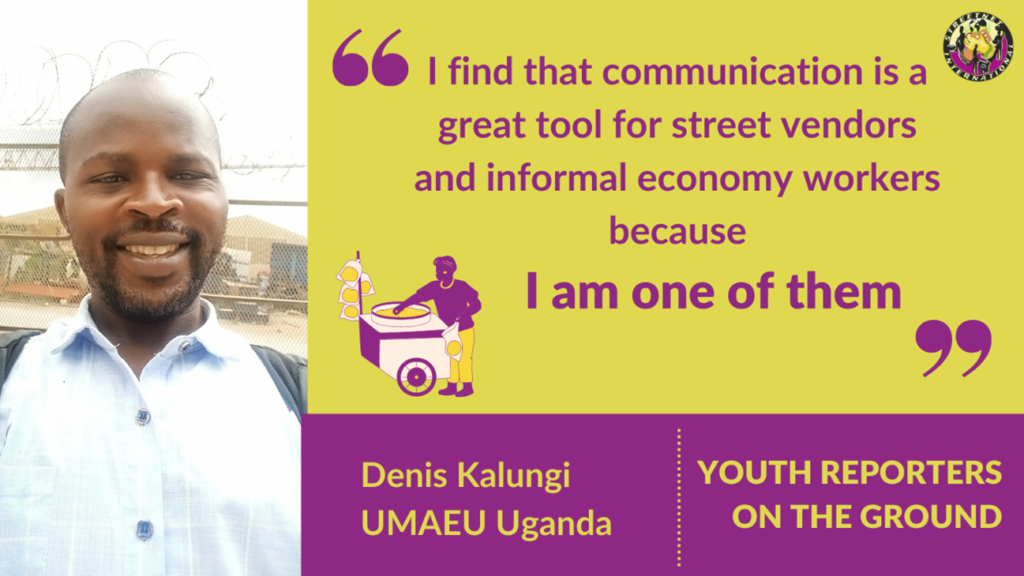
My name is Denis Kalungi. My nationality is Ugandan and I am 34 years old. I was born in a town called Lugazi. My parents worked in Lugazi sugar factory. That gave me the chance to know and become friends with Mr. Mehta, the owner of the sugar-corporation of Uganda. He introduced me to golf and while I lived there, I had the chance to become a good golfer because Mr. Mehta owns a golf club.
Me emerging as a good golfer prompted Mr. Mehta to pay tuition for my Bachelors’ Degree in Information Technology at Kampa International University. Four years after my graduation, I started working at Banda Market, which is found in Kampala, the capital city of Uganda.
I worked in the market as a vendor to earn an income. There, I heard about a meeting of the Uganda Markets and Allied Employees Union (UMAEU). I recorded the scheduled date and attended the meeting. For all the issues that were raised, I managed to offer a way forward for them. This gave me a warm welcome by the General Secretary for UMAEU, because he had met a committed person.
This happened at a time in which they were about to close the election of the next Executive members. My name was suggested, and people voted for me as Deputy Secretary in Research. This helped me to understand social justice, human and workers’ rights, and trade unionism inside and outside of Uganda. It also motivated me to write the UMAEU strategic plan, which is not yet implement due to a lack of funds.
Since I am currently shepherd of many herds from Kireka Christian fellowship and a global teacher and writer of God’s message (at https://awakeningsaints.org), I felt responsible to have an economic and social impact in people’s lives.
As the informal economy is my origin, I find that communication is a great tool for street vendors and informal economy workers because I am one of them. We have been finding difficulties to present our challenges and sometimes, even when we get the chance to do so, we don’t know how to do it. Today, I find it important to create a global network throughout the world and mobilize younger activist who have been stigmatized for so long, with the hope that this IS the time for mobilization and to bridge the information gap between vendors in our union and StreetNet through storytelling, data gathering and article writing. Stay blessed.
Djenabou Sow (CNTG – Guinea)
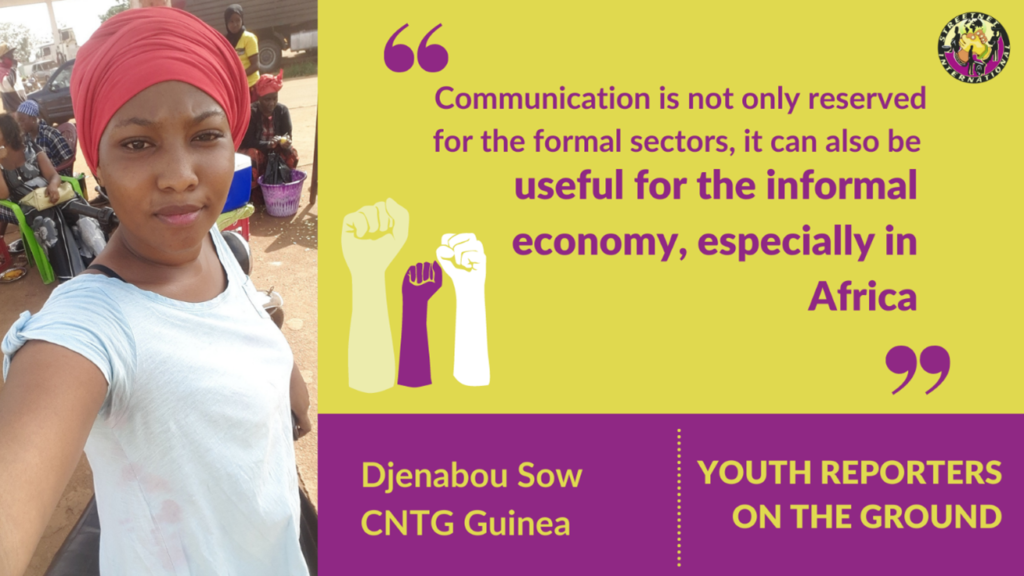
My name is Djenabou Sow and I am 20-years-old. I am an activist, a feminist, and I come from Guinea-Conakry.
The informal sector is considered harmful by the formal sector because it does not pay taxes and can therefore sell at a lower cost. It is a sector where the State does not control the activities of its people, where there are no support measures, no assistance, and no legal and organizational guidelines from the State. Nowadays, the informal economy is an activity linked to all: to immigrants, unemployed, children with families and abandoned children, and by women who have family responsibilities and who fight everyday to survive. They are only trying to get through the day. They are not covered by the national social security fund. However, this sector has become a concern for most of the population.
Communication is linked to any economic, social and cultural development, which affects all income-generating activities. Communication can use several channels: editing and broadcasting of videos, doing interviews, taking photos, publishing magazines, posting, and sharing on social media (Facebook, Twitter, LinkedIn and Instagram), which can immerse people and affect their reality. However, communication is not only reserved for the formal sectors. It can also be useful for the informal economy, especially in Africa. But most communication focuses on developed countries and the formal sector. We should also leverage it to support informal entrepreneurial activities.
My skills are diversified: I performed different tasks which led me to be versatile. My formal education in economic philosophy, managing social media, and writing and collecting information.
Edna Sibanda (SAITA – South Africa)
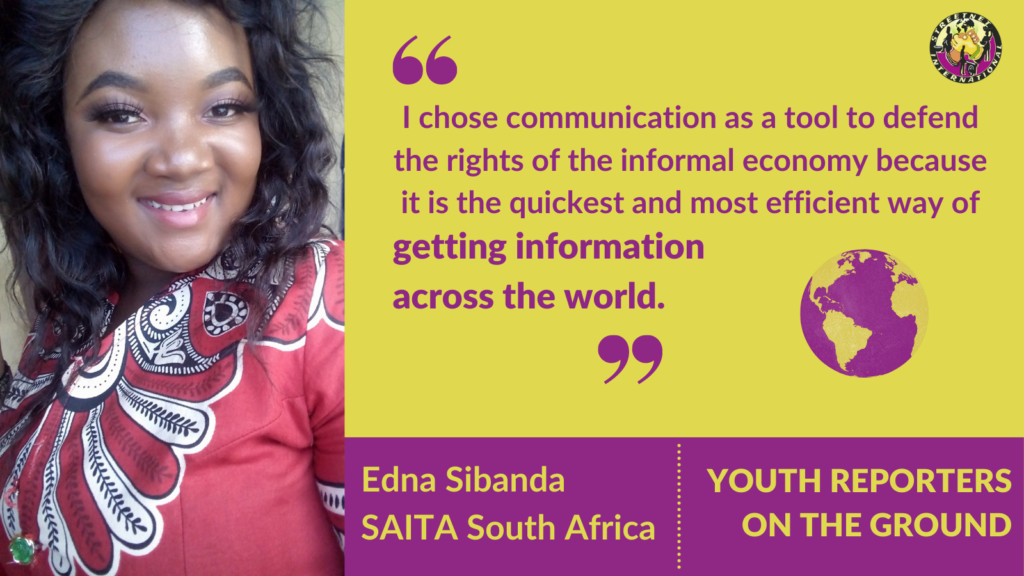
My name is Edna Sibanda and I am 21-years-old. I am from South Africa, from the capital city of the North West called Mahikeng. I am an informal trader, an aspiring entrepreneur and a future broadcast journalist. I am a member of the South African Informal Traders Alliance (SAITA), which is an affiliate of StreetNet International.
Informal traders are faced with so many challenges on a daily basis. Not having proper advocacy for them does not aid in any of their struggles. Being an informal trader myself is one of the reasons why I care so much about the rights of informal traders. One of the biggest reasons why it is so important to advocate for our rights is because local municipalities have been developing by-laws or policies that were intended to make trading easier, but these policies have over the years proved to be null and void.
I chose communication as a tool to defend the rights of informal economy workers because it is the quickest and most efficient way of getting information across the world. Social media has been the most accessible communication tool in recent years, and it has been reliable to generate feedback within a short time. This proves that communication is the best way to advocate for the rights of informal economy workers’ communities.
I have achieved so many things since I joined the informal community and I have developed a lot of skills within a short time. Starting my own business at the age of 17 has been by biggest accomplishment so far which I am proud of.
Dorcas Rachetée Ishimwe (SYTRIECI – Rwanda)
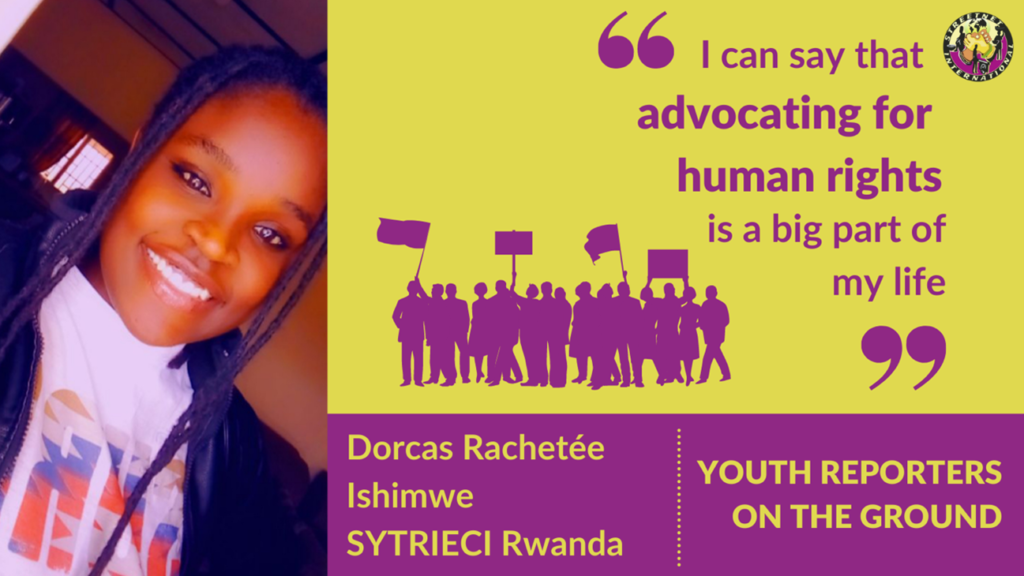
I am Dorcas Rachetée Ishimwe, a 21-years-old Rwandan. I have a passion for advocating for people and mass communication in general. That is why I am currently pursuing a Bachelors’ degree in Mass Media and Communication.
I work as a Communication Officer in an organization called SYTRIECI, which is affiliated to StreetNet International. I started working for this organization when I was 18, and it was a very big help to me as I was following my communication studies. I have learned a lot through these almost four years I spent with SYTRIECI and now I can say that advocating for human rights is a big part of my life.
I grew up in Kigali, the capital city of Rwanda, with my three younger brothers and my parents. I love taking pictures, writing and reading in my free time. Surprisingly, I do all of that while listening to music. I also love to travel, even though I haven’t been able to do it as much as I wanted due to COVID-19. Hopefully, it will end soon.
I recently was selected to be one of StreetNet International Youth Reporters on the Ground and I am very excited and thrilled to experience this new opportunity. I wish you all a great and healthy life ahead!
João Lucas Gama (UNICAB – Brazil)
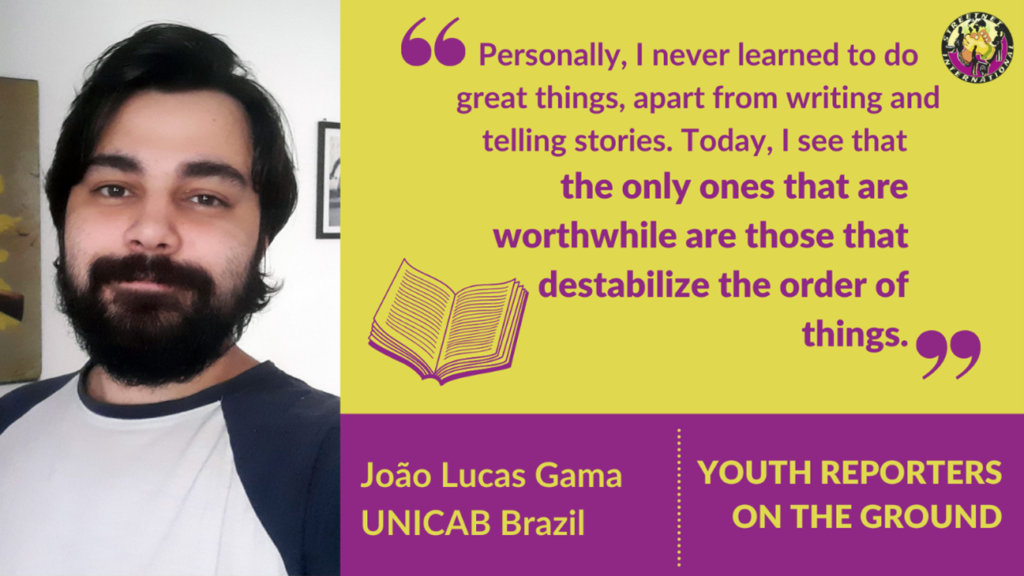
I am pleased to meet you. I am João Lucas Gama! I grew up in a place called Camaragibe, on the outskirts of Recife (where I currently live). I believe that no one becomes themselves alone, so to tell you about me, I need to talk about other people first.
I am the son of a woman named Ywanoska, a name of Russian origin in Latin American lands and that, by itself, would yield an excellent novel of fantastic realism. A teacher highly influenced by Paulo Freire’s ideas, she sought to practice a libertarian and socially engaged education. Passionate about literature and the art of storytelling, she ended up giving me the habit of reading and, because of her, I started to create my own plots.
I remember that on her days off, when we would go to the beach or the park, she would sit for hours, always watching us, as she flipped through books and magazines she couldn’t read during the busy weeks. At those times, I looked at her from afar and thought: “one day I will write stories for her, so that she can read when she no longer has to work”.
Years passed and I was able to study journalism. During my studies, I got involved in political activism in mid-2013, when Brazil was getting ready to host the World Cup. At the time, several movements began to emerge and/or gain notoriety in Recife, establishing the Right to the City and proposing to re-signify the urban space. Among them, one in particular caught my attention: the Informal Trade Workers’ Union of Recife (SINTRACI).
Its self-managed form of organization was, for me, a transformative experience, as it seemed to herald a new labor vanguard that moved away from the plastered and physiological practices adopted by conventional union structures in Brazil, while also expanding the understanding of the “working class”, making it more heterogeneous and highlighting the need for reconstruction and humanization of our cities.
It was through friends and fellow activists that I was able to meet some of the leaders of this movement, who quickly became good friends and, above all, references in the struggle. Together, we developed (in an amateurish way and without resources) a small webseries entitled “Fala Informal” (“Informal Chats”), where workers in the informal economy spoke about their lives, impacted by social inequalities, prejudices, police violence and the denial of human and constitutional rights – something that I came to call the “informal existence”.
Since then, I have not been separated from the struggles waged by street vendors, which I started to follow more closely, in street acts and assisting in UNICAB’s communication. It is increasingly clear to me that journalism and communication are fundamental fields of dispute over ideas and social transformation that need to be occupied by workers, reflecting their needs in an inclusive and radically democratic way.
Personally, I never learned to do great things, apart from writing and telling stories. Today, I see that the only ones that are worthwhile are those that destabilize the order of things. I no longer dream of writing for retired teachers, but of helping people tell their own stories, in order to create collective narratives and new life possibilities.
Nancy Likiripa (ZCIEA – Zimbabwe)
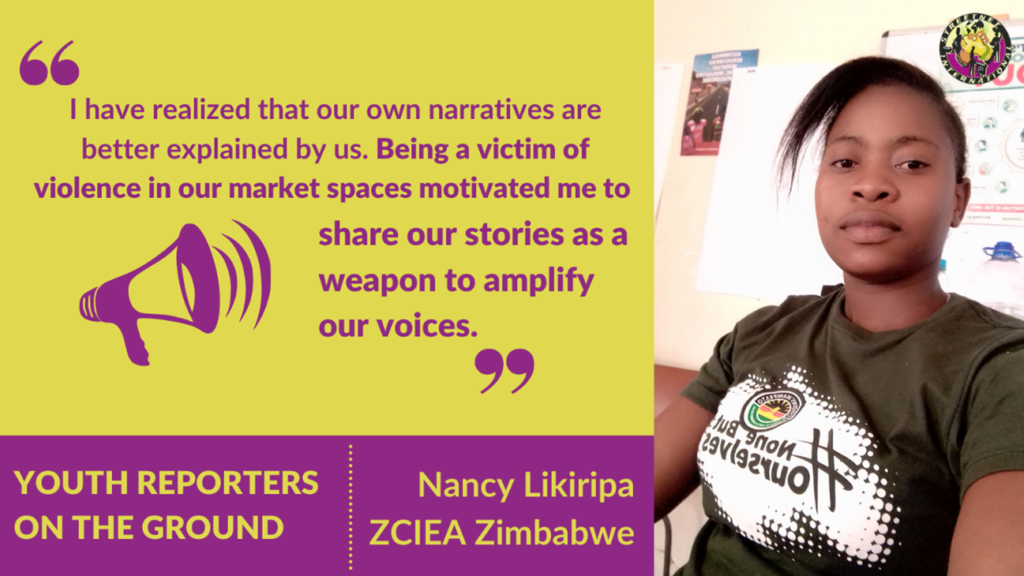
My name is Nancy Likiripa. I am from Zimbabwe, and I am 25 years old. I am currently pursuing a degree in Development Studies. I am also looking forward to studying a Master’s in Media and Communication. As a member of ZCIEA, I have been selected as a Youth Reporter by StreetNet International.
I have realized that in my country many young people are in informal trading. I am also a street vendor. I am so passionate about workers, our safety, and the rights of street vendors. The current situation caused escalating violations in our workplace. I have realized that our own narratives are better explained by us. Being a victim of violence in our market spaces motivated me to share our stories as a weapon to amplify our voice.
I am now a whistle blower regarding informal traders’ rights, and I have managed to engage the local authorities and duty bearers for better marketplaces. I am also engaged myself in citizen journalism to create enough evidence for our voices to be heard.
Parvin Alizade (Eastern Europe and Central Asia region)
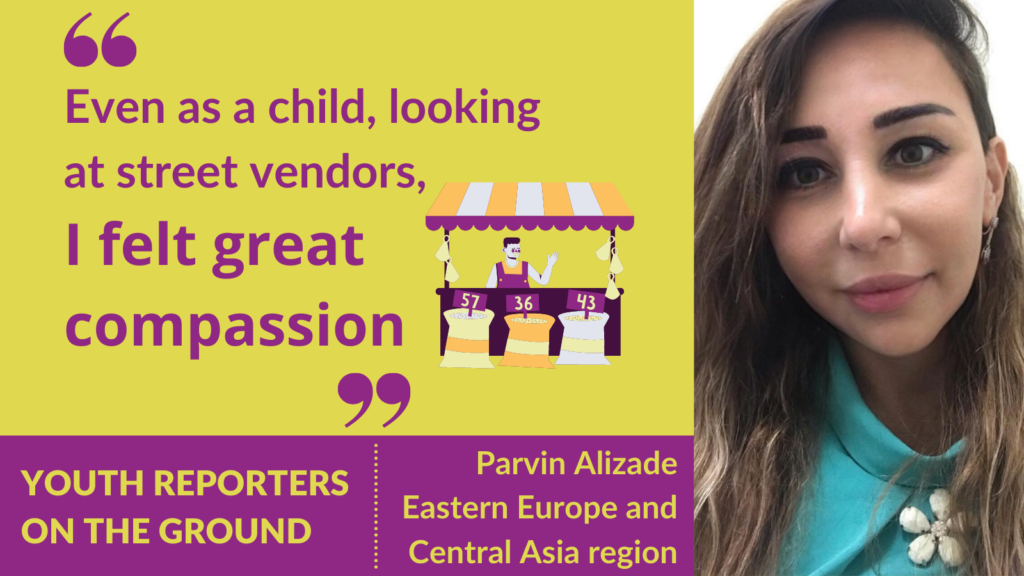
My name is Parvin Alizadeh. I worked as a teacher for a long time. After applying for a job at Xhidmat-Ish, I heard about the organization StreetNet. I was pleasantly surprised that there is such an organization. I was also glad that Azerbaijan and our organization Xhidmat-Is are member of this organization. I believe that in Azerbaijan, the rights of street vendors need to be protected, since their number in our country has always been high. They have always sold rural products, vegetables and fruits, mainly on the streets of the city. I always thought that their rights should be protected.
Even as a child, looking at street vendors, I felt great compassion. On cold days, when ordinary people work in offices and after they rush to their warm homes, street vendors have to endure the wind and cold. It should be reminded that in Azerbaijan, in Baku, the winter temperatures can reach 1Cº, also because Baku is also called the “city of winds”, they have to endure the wind, which on average is 6.7 meters per second, sometimes reaches up to 30-40 meters per second. Every time I ran home from school, I looked at them and felt compassion, sometimes stopping to buy something, knowing that the need makes them endure this cold.
In addition, these people are deprived of the basic provision of human needs. They can’t eat normally, they are forced to drink and eat on the street, mostly starving. It is also difficult for them in the summer, since the temperature in Baku reaches +42 in summer, street vendors, despite the possibility of sunstroke, also sell on the street. In the summer, you can see these street vendors on the roads on the way to the regions of Azerbaijan. These scenes are familiar to every Azerbaijani and guests of the city and country. And like any humane person puts himself in their position, assuming their role.
Many people understand that this trade is the only income of a person, and therefore of the family as a whole. Seeing their condition, I always thought that they needed support, but my support so far consisted only of buying their goods, I could not pass by an old grandmother who sells trinkets or something like that without buying something. I have seen tall, stately men who trade in the street and they look at you begging, that you buy something from me. I have always treated these people with respect, they do not steal, do not beg, they sell their products wherever they can, while sometimes tolerating different people. As if we were sorry, but not all people treat them with compassion, sometimes the police, fulfilling their duties, asks them to leave the places of trade. I am very glad that today, through your organization, I had the opportunity to help them not only passively, but at least, somehow participate in the process of improving their condition.
I would like them to also unite in groups, for example: grocery vendors, vegetable vendors, etc. This would help us to hear their problems, and in the future to involve the authorities and local municipalities, organizing two or three-sided dialogues. I really hope that if we, me included, will be able to improve their condition by at least 1%, I will consider myself a little happier. I am very glad to join StreetNet and I really hope that we can make at least some steps and with joint efforts we could achieve some improvement in street vendors condition of not only in Azerbaijan but also in other countries too.
Stanley Diaz (FESTIVES – El Salvador)
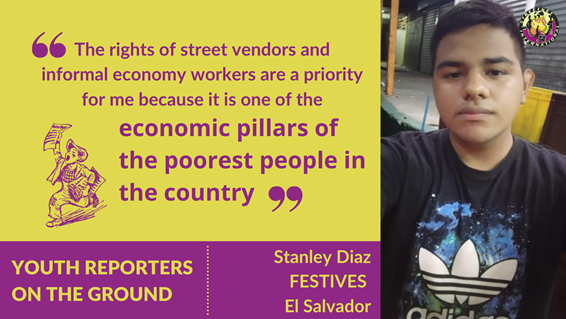
My name is Stanley Diaz and I am from El Salvador, a country located in Central America.
The rights of street vendors and informal economy workers are a priority for me, because the informal economy is one of the economic pillars of the poorest people in the country, who therefore need to resort to the informal economy in order to survive. We will continue this struggle until we can achieve a dignified life for all in the informal economy and a law that protects its workers.
I chose to invest and belong to the communication team so that the country and the world can be given a perception of what it is like to work in the informal economy through photos, videos and interviews, and to ensure there is a more conscious thought about the sacrifices that are made, day by day.
Plamedie Kingualu Mavivana (LDFC – DR Congo)
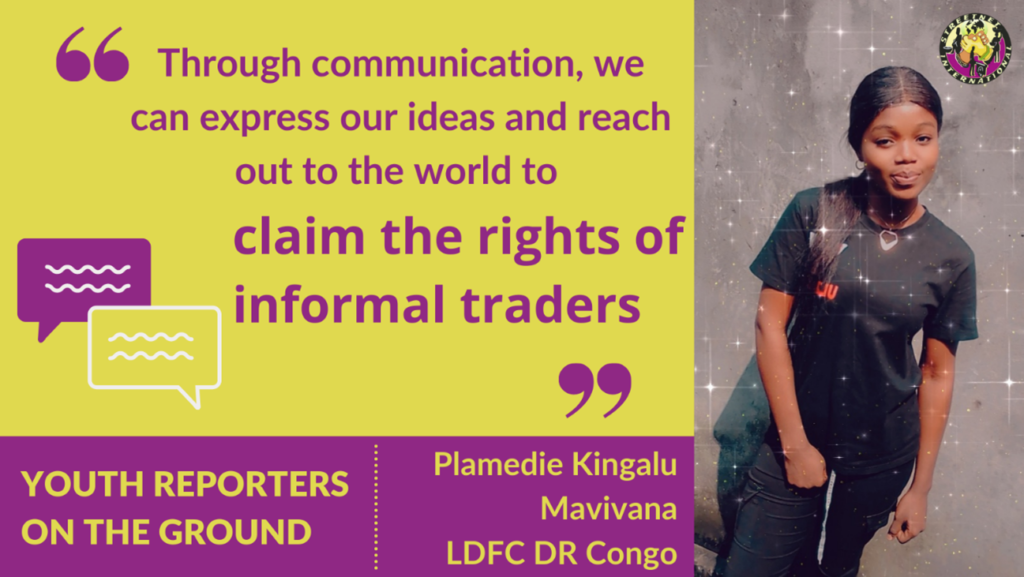
As a worker in the informal economy, I care about the rights of street vendors and workers in the informal economy because the survival of 90% of households in the DRC depend on the informal economy, which allows them to pay for schooling of children, rents, and health of the family.
My concern in this training is to promote the access of “invisible” workers, such as street vendors, to safe health coverage because they are exposed to accidents.
I chose communication as another way of defending the right of street vendors and informal economy workers, because communication is a means to defend our ideas. We can come into contact with the world and claim the rights of street vendors, because media is the 4th power of a country.
By choosing communication as another defense of the rights of street vendors and workers in the informal economy that communication is a means by which we can express our ideas to come into contact with the world to claim the rights of salespeople because communication is the 4th power of a country.
Thanks to communication we can convey information and train street vendors about how to promote their invisible work through communication tools.
Communication helps us reach out to customers to combat declining profit; it allows us to connect with the public instantaneously.
Uthman Kaisi (MUFIS – Malawi)
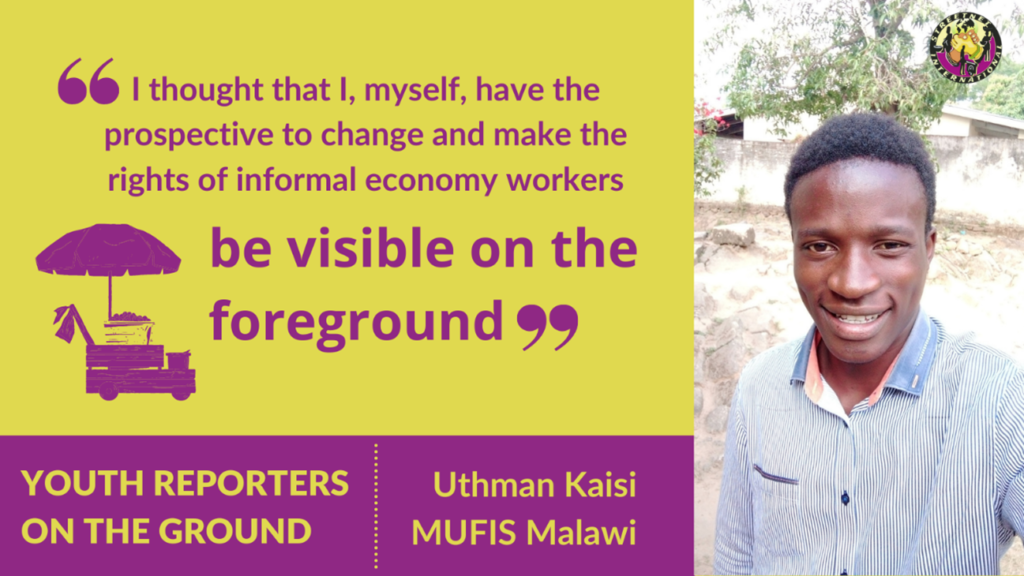
My name is Uthman Kaisi and I was born in the outskirts of the Blantyre city in August 1999. I am the youngest in a family of eight, of which I know six. I have resided most of my life in Sigerege village. Different circumstances have been happening in my life which led me to this path I find myself in.
I grew up in a family in which the breadwinner, my father, was working at a certain company in the middle of the city. The money which he earns monthly was not even enough to pay the school fees for all of us. What about basic needs? This life caused a lot of stress to my father and to the entire family. I remember my mother used to bake African cake. also known as Zigumu in the local language, to help support the family. I finished my primary school without much financial problems, as it required a small amount of money and my good performance at school allowed me access to other things such as notebooks.
Despite my visions of the future and good intentions to pursue secondary school studies, many circumstances influenced my path. I was devastated that I could not make my dreams come true. All I needed was to complete secondary education and become part of the Fourth Estate, the media. As my dream was to be a journalist, I read many different articles whenever I could. But, mostly, I used to listen to the radio because we had one at our house. A story about a vagabond, a rogue and a vendor that led to a change in the law encouraged me to pursue my dream.
I thought that I, myself, have the prospective to change and make the rights of informal economy be visible on the foreground. The informal economy contributes greatly for the development of the country, yet they are the ones which are always underestimated. They cater to the needs of a large number of customers from a lower- and middle-income class and contribute significantly to the economy. Many of them also generate revenue for the cities through payments for permits and fees and other kinds of taxes.
Through my experience on how the informal economy is being looked at, I thought of how to defend informal economy workers. For many people don’t know how the informal economy is important to the entire economy. What they need is to be given that knowledge. So, communication is the best way to defend informal economy workers against malpractice and educate people so they can understand the issues better.
I always dreamed of being one of the media practitioners. Even though I have been going through many difficulties, I fortunately found myself in tertiary education where I am studying what I always wanted. This is also a chance to fulfill what I dreamed: civic education and changing people’s mindsets through media.
Pearl Lawrence (KTB – Lesotho)
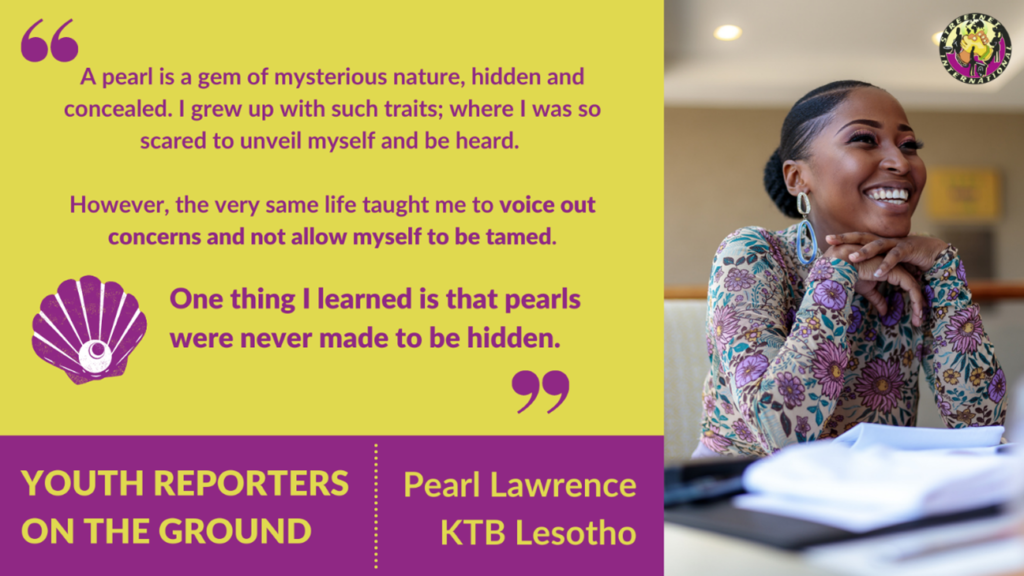
A pearl is a gem of mysterious nature, hidden and concealed. I grew up with such traits; where I was so scared to unveil myself and be heard. However, the very same life taught me to voice out concerns and not allow myself to be tamed. One thing I learned is that pearls were never made to be hidden, they ooze with so much profundity that is just waiting to be explored.
Furthermore, I have been exposed to information of what goes on in the world from a very young age. Having a father who is a journalist and a mother who worked for the national bank, there was emphasis on knowing what was happening in the world and the problems it faced. The house was filled with books on political leaders and African literature to newspapers and for a curious person like me; I could not wait to explore, indulge and ask a thousand questions. Unaware that I would grow to become a macroeconomics enthusiast.
I hold a BA(Hons) in International Business from the Limkokwing University of Creative Technology and I was tenured as a Student Ambassador. I served the institution for three years and I learned that leadership does not only entail holding a higher position but most importantly serving the people. This became the prevalent motive behind my career and leadership journey and taught me to be humble. This assisted me with core competencies of functioning under pressure, being more reliable and accountable, staying ahead of situations and forecasting them properly.
As an academic scholar, I flourish in independent research opportunities such as my final year thesis which focused on the Socio-economic impact of Letseng Diamond Mine on local communities in Mokhotlong. The research challenged me to execute great analytical, investigative and critical thinking skills. Furthermore, I was able to establish a movement named She’s Outta Your League (SOYL) which focuses on one of the UN sustainable development goals of woman empowerment. It aims at giving them a platform to voice out social concerns and eradicate being tamed by societal chauvinism through activism. Into the bargain, it addresses empowerment in a unique way that steers women into financial independence through business mentorship and financial health programmes.
Through this, I was able to start my beauty product, Tupperware business as an informal trader and got to experience the challenges and inequalities faced in the country. With the opportunity to advocate for StreetNet, I will dedicate my experience to ensure an enriched economy of Lesotho and I intend to develop global networks through active participation in the programs necessary for my contribution to Lesotho’s development in the future. In addition, I aim at dedicating myself to the country and Khathang Tema Basotho (KTB) in relation to informal trading and getting involved in negotiating and reforming policies of street vendors, ensuring economic development and growth in order to ensure inclusiveness, improve the standards of living of Basotho, eradicate poverty and instability in Lesotho and Africa at large.
Registered as a nonprofit organization in South Africa.
PBO 930030585
Content license: CC BY-SA 4.0
Physical address 45 Claribel Road Windermere Durban 4001, South Africa

By entering your personal data and clicking “Suscribe,” you agree that this form will be processed in accordance with our privacy policy. If you checked one of the boxes above, you also agree to receive updates from the StreetNet International about our work